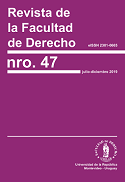O Sistema Clássico de Lógica Deóntica:
uma perspetiva crítica
DOI:
https://doi.org/10.22187/rfd2019n47a9Palavras-chave:
lógica deóntica, Von Wridht, sistema clássico, paradoxos, Dilemas de JørgensenResumo
A lógica deóntica nasceu 1951 com a publicação, na revista Mind, do comemorado artigo de George Henrik Von Wright: Deontic logic. Esse momento constitui um ponto de referência na historia da lógica, já que, a partir disto começou seu estudo sistematico. Agora bem, o Sistema Clássico de Lógica Deóntica, que nasceu neste artigo, é um do máis estendidos, especialmente, entre os juristas e os filósofos do direito. Isto deve-se, nomadamente, a sua estrutura simple e ao fato de que responde mais adequadamente a nossas intuiciones sobre como funcionam os conceitos deonticos (permitido, proibido e obligatório), pórem, este sistema não está isento de importantes problemas e dificuldades. Neste senso, o presente trabalho pretende:1. Fazer uma exposição detalhada da estrutura e elementos essenciais do Sistema Clássico de Lógica Deóntica.2. Mostrar os problemas e paradoxos principais a os quais este se enfreta.3. Fazer um breve balanço sobre a importância à luz do seus diversos problemas e virtudes.
Downloads
Referências
Alarcón Cabrera, C. (1999). Imperativos y lógica en Jørgen Jørgensen, Isegoría, (20), 207-215.
Alarcón Cabrera, C. (1990). La paradoja de los imperativos contrarios al deber: Una muestra de la evolución de G. H. Von Wright, Doxa, (8), 187-209.
Alarcón Cabrera, C. (2003). Las lógicas deónticas de Georg H. Von Wright, Doxa, (26), 109-126.
Ausín, T. (2005). Entre la Lógica y el Derecho. Paradojas y conflictos normativos, México: Plaza y Valdéz.
Bulygin, E. (1995). Lógica deóntica. En C. E. Alchourrón, J. M Méndez, R. Orayen, Lógica. Enciclopedia Iberoamericana de Filosofía (pp. 129-142), Madrid: Trotta.
Deaño, A. (1981). Introducción a la lógica formal. Madrid: Alianza.
Deaño, A. (1980). Las concepciones de la lógica. Madrid: Taurus.
Ferrater Mora, J. (1979). La filosofía actual. Madrid: Alianza.
González Lagier, D. (1994). Acción y norma en G. H. Von Wrigh. España: Universidad de Alicante.
González Lagier, D. (2008). G. H. Von Wright y los conceptos básicos del derecho. México: Fontamara.
Guibourg, R. A. et. al. (2008). Lógica, proposición y norma. Buenos Aires: Astrea.
Guibourg, R. A. (2010). Derecho, sistema y realidad. Buenos Aires: Astrea.
Hume, D. (2014). Tratado de la naturaleza humana. Barcelona: Gredos.
Kalinowski, G. (1973). Introducción a la lógica jurídica. Buenos Aires: Eudeba.
Kalinowski, G. (2015). Lógica de las normas y lógica deóntica. México: Fontamara.
Otero, C. P. (1989). Filosofía del lenguaje, en M. Garrido, Lógica y lenguaje. Madrid: Tecnos.
Pichel Luck, M. (2014). La función de la lógica deóntica. ¿Qué queda de ella luego de las paradojas?, Revista de Derecho y Ciencias Sociales, (10), 118-130.
Pradilla Rueda, M. (2015). Evolución y elementos de la lógica deóntica, Rev. Ingeniería, Matemáticas y Ciencias de la Información, (4), 77-95.
Quine, W. O. (1976). The Ways of Paradox and Other Essays. Cambridge: Harvard University Press.
Rodríguez, J. (2016) Razonamiento y decisión judicial. Buenos Aires: Ministerio de Justicia y DDHH de la Nación.
Vernengo, R. (1987). Derecho y lógica: un balance provisorio, Anuario de Filosofía del Derecho, (4), 303-330.
Von Wright, G. H. (2003). ¿Hay una lógica de las normas?, Doxa, (26), 31-52.
Von Wright, G. H. (1951). Deontic lógic, Mind, (237), 1-15.
Von Wright, G. H. (1970). Ensayo de Lógica Modal. Buenos Aires: Rueda.
Von Wright, G. H. (1979a). Lógica Deóntica. Valencia: Cuadernos Teorema.
Von Wright, G. H. (1979b). Norma y acción. Madrid: Tecnos.
Von Wright, G. H. (2010). Normas, verdad y lógica. México: Fontamara.
Zavadivker, N. (2001). David Hume y la imposibilidad de pasar del ‘es’ al ‘debe’. En S. Maidana, Los avatares de la modernidad, Tucumán: UNT.
Zavadivker, N. (2003). La lógica clásica y su inadecuación a la argumentación informal, La Revista, (5), 1-8.
Zavadivker, N. (2004). Una ética sin fundamentos. Tucumán: Instituto de Estudios Antropológicos de la UNT.
Publicado
Como Citar
Edição
Seção
Licença
Revista de la Facultad de Derecho. Creative Commons Reconocimiento 4.0 Internacional License.


